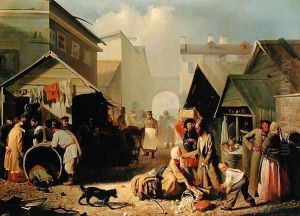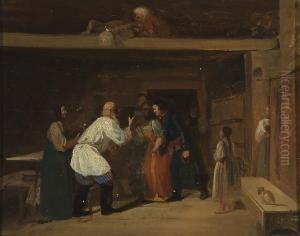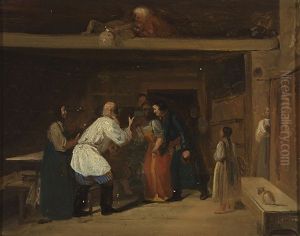Adrian Markovich Volkov Paintings
Adrian Markovich Volkov was a Russian artist born in 1886. His work is not widely known outside of specialist circles, but he made significant contributions to the Russian Avant-Garde movement, a trend that sought to break with traditional artistic practices and embraced abstraction, futurism, and constructivism among others. Volkov's career spanned a tumultuous period in Russian history, encompassing the fall of the Russian Empire, the Bolshevik Revolution, and the subsequent formation of the Soviet Union. These events profoundly influenced his artistic direction and the themes of his work.
Volkov received his formal education in art at the Moscow School of Painting, Sculpture and Architecture, where he was exposed to a variety of artistic styles and movements. His early work was characterized by a fascination with traditional Russian iconography, which he combined with elements of European modernism. However, as the political landscape in Russia changed, so too did Volkov's art. He began to incorporate more abstract elements into his work, reflecting the avant-garde's desire to break away from the past and create a new artistic language that could express the revolutionary spirit of the times.
Despite his innovative approach to art, Volkov's career was fraught with difficulties. The Soviet regime's increasingly strict control over artistic expression meant that many of his works were deemed ideologically unsound. This led to periods of poverty and obscurity for Volkov, as he struggled to reconcile his artistic vision with the demands of the state. Nevertheless, he continued to produce work that pushed the boundaries of the accepted norms, experimenting with abstract compositions and exploring the intersection of art and industrial design.
Volkov's contributions to the Russian Avant-Garde were largely overlooked during his lifetime, and he remained a peripheral figure in the art world until after his death in 1942. In recent years, however, there has been a growing interest in his work, with art historians and collectors beginning to appreciate the unique perspective he brought to the movement. His paintings, which often feature bold colors, dynamic compositions, and a blend of traditional and modernist elements, are now recognized as important examples of early 20th-century Russian art.
Despite the challenges he faced, Adrian Markovich Volkov's legacy as an artist is a testament to his resilience and dedication to his craft. His work continues to inspire new generations of artists, serving as a reminder of the power of creativity in the face of adversity.


